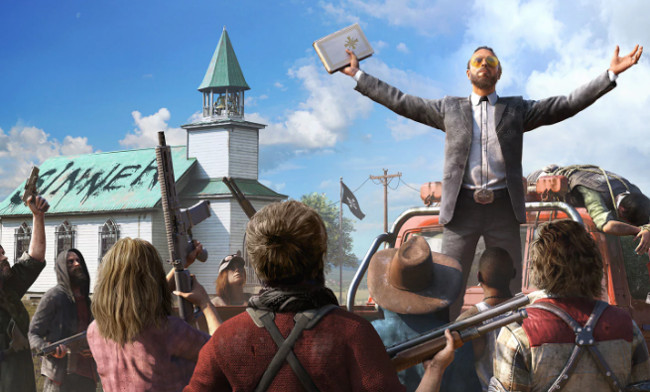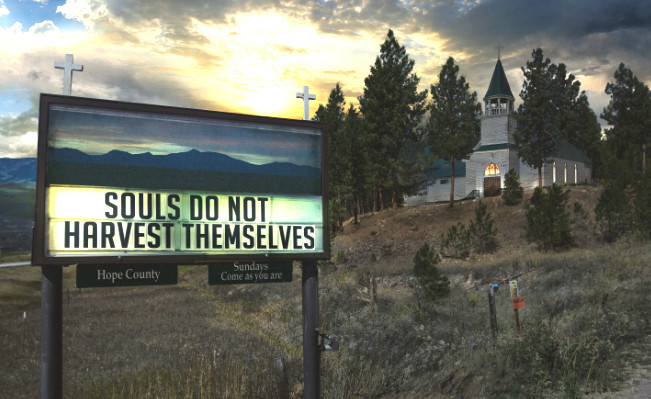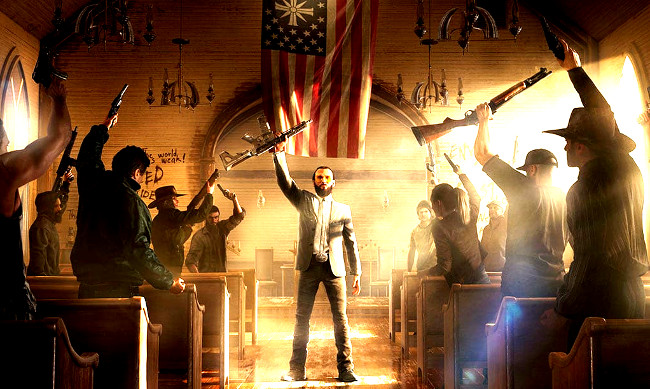
In Far Cry 5, the game series, which has previously seen its anti-heroes fight off drug dealers in tropical islands and bitter despots in a Himalayan country, goes to America, specifically the fictional Hope County, MT, where you play a deputy with the Hope County Sheriff’s Department who starts work right when the leader of Eden’s Gate pulls a county-wide coup. What’s most unnerving about the game is that its four main villains truly think they’re the good guys, cutting together bright cheerful infomercials and lovingly explaining the importance of trusting their “father” even as they torture and kill.
The game, of course, takes liberties with reality. But the Far Cry team worked closely with cult experts to capture some essential truths about how cults indoctrinate and control people, including documentarian Mia Donovan. Donovan’s documentary Deprogrammed follows the story of her stepbrother, who her stepfather believed was in a cult and subjected to “deprogramming,” the controversial “reverse brainwashing” technique to free him from his love of heavy metal and the Satanic Bible.
In the process, Donovan learned a lot about cults, how they work, and, most importantly, that what we think of as a cult is very different from the reality she confronted. Donovan spoke with us about her work, the game, and how none of us can spot a cultist. Or, for that matter, realize we’re in a cult until it’s too late.
UPROXX: What was your first reaction when the Far Cry team approached you?
Mia Donovan: I was open-minded, and when I met with Dan [Hay, creative director], I was so impressed with how interested he was in the psychology of how cults operate. This is really early on, all he knew was that he was interested in cults and Montana. He wasn’t sure it was something he could explore. I just didn’t know anything about video games, and I was impressed with how they approached the topic. I would go in every six weeks or so with the writing team and show them some material and they all really dove in.
It seems like there’s a lot of misconception around cults.
There’s a lot. The one bias that I had was that I assumed that people were more vulnerable because they were somehow isolated or going through a hard time. Which is true to some degree, but for the most part, the majority of people that I met were very involved, highly intelligent, very motivated people. They were people who wanted to change the world in some way, and I can understand historically why they were such a thing. And in the ’60s and ’70s, the idea that you had to change yourself before you change the world. Most of the big cults that we know, they want people that are skilled and can do a lot of work, and can be of service. That’s one of the big biases, people who join cults aren’t necessarily victims.

The game has to take liberties for the sake of entertainment, but are there bits that you hope people pick up on about cults in the game?
Talking to Dan and the team was to speak more from my first-hand experience. When I talked to former and current members, it’s more the group psychology that indoctrinates you that the leader. The game is a game and it can’t really replicate a lot of these indoctrination processes. But they did write in the processes that accelerate it, and it all comes back to a logic that’s grounded in historical facts. And also there’s this ambiguity, whether or not the leader of the group understands he’s being manipulative versus how much he believes he’s God. We’ll never really know how much they believe, and how much is coercion and manipulation.
There’s a strong religious theme to Eden’s Gate here, and I know some people tend to lump religions and cults in together. What’s the difference?
Normal religion is about an abstract being. The cult is around the individual who embodies God, David Koresh, for example. I think in those extreme circumstances, people lose their capacity for critical thinking. It’s a very complex process, and that’s what makes it so fascinating. Culturally we’re really interested in cults because we’re encouraged to celebrate our individuality. Cults erase that.

How quick is this process? In the game we see cult members take a while to become fully indoctrinated.
One of the women I met who joined the Moonies in 1971, and really early, the first three weeks, she thought she was involved in an anti-war group. It was only after she’d invested a lot in the group, which is a manipulation tactic a lot of social psychologists called “thought reform”, and all through it people just shower you with love, attention, and praise. It’s a manipulation they don’t even realize they’re doing. They think they have to save you. Only three weeks later, she really believed she was one of the chosen. Some people I met started off with meditation classes, and six months down the road, they believed they’d get sick if they stopped. These groups start to build phobias in your mind so you feel like you can’t really leave.
When I discussed Far Cry 5, a lot of people found it a bit implausible a cult could grow like that, and often it boiled down to some form of “Well, I know I wouldn’t fall for this!” What would be your response to that?
I think if we’re educated on how manipulation work and how suggestions work, we can protect ourselves. But I don’t think anybody is 100% immune to being manipulated. We absorb outside ideas every day. It’s a hard thing people ask me about, and I don’t really have a pat answer. What I can say is when I first started meeting with people who are in cults, I didn’t think I could have a normal conversation with them. I thought they were zombies. But they’re people like you and I, you’ll have a normal conversation and then they’ll say something about how their leader is the coming of Jesus.
Do cult members ever realized they’re being manipulated?
It really depends. In Jonestown, there were mothers giving the [Flavor Aid] to their children first, and they really believed they were saving them. One quote that I get a lot people kept bringing up, is from Eric Hoffer, “How you can judge the strength of a movement by the tangibility of its demons?” There has to be an enemy, that you work on people’s fears to get them come together. You don’t even need a god, you just need an enemy.
Is there a question you wish you were asked more often about cults?
Sometimes the simple questions are the hardest. I guess it’s “How can you tell if somebody’s in a cult?” You really can’t.
